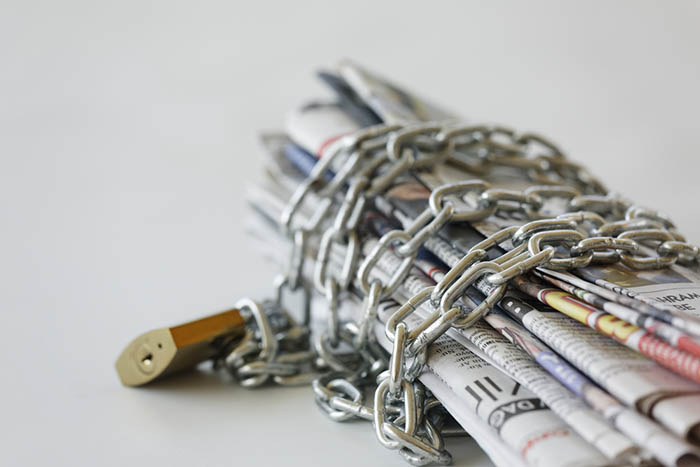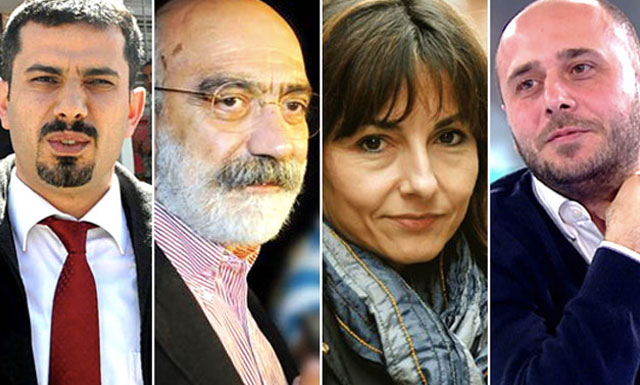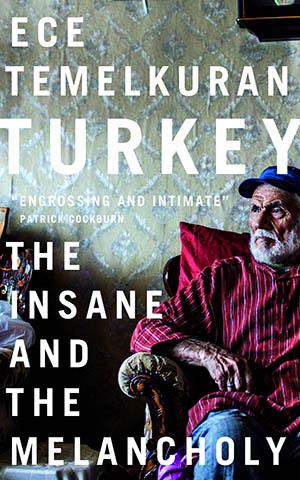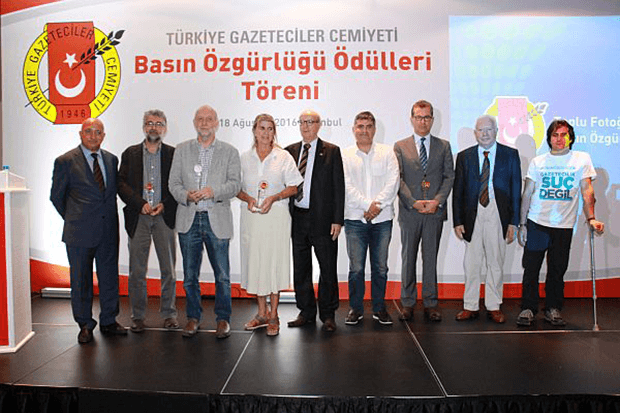2 Sep 2016 | Albania, Azerbaijan, Azerbaijan News, Europe and Central Asia, Kosovo, Mapping Media Freedom, News, Russia, Turkey
 Each week, Index on Censorship’s Mapping Media Freedom project verifies threats, violations and limitations faced by the media throughout the European Union and neighbouring countries. Here are five recent reports that give us cause for concern.
Each week, Index on Censorship’s Mapping Media Freedom project verifies threats, violations and limitations faced by the media throughout the European Union and neighbouring countries. Here are five recent reports that give us cause for concern.
30 August 2016 – The home of veteran journalist and Index contributor Yavuz Baydar was raided by the police, the journalist reported via Twitter.
The raid came shortly after detention warrants were issued for 35 people including 27 journalists. As of 30 August, of the 27 journalists sought nine have been detained in Turkey while 18 other journalists are reportedly abroad.
Also read by Baydar: Turkey: Losing the rule of law
28 August 2016 – At around 10pm an unidentified individual threw a hand grenade at the house of Mentor Shala, the director of Kosovo’s public broadcaster RTK.
Shala and his family were inside at the time. No casualties were reported but according to the RTK director the explosion was strong and that it had shocked the whole neighbourhood.
Kosovo’s police are investigating the case, which is the second attack on national broadcaster RTK within a week. On 22 August 2016 an explosive device was thrown at the broadcaster’s headquarters.
President Hashim Thaci has condemned the attack. “Criminal attacks against media executives and their families threaten the privacy and freedom of speech, and at the same time seriously damage the image of Kosovo,” he told RTK.
Both attacks were claimed by a group called Rugovasit, which said in a written statement to RTK that the attack was “only a warning”.
Rugovasit blames RTK journalist Mentor Shala for only reporting the government’s perspective. “If he does not resign from RTK, his life is in danger,” they said.
27 August 2016 – Journalist and founder of news agency Novy Region, Alexander Shchetinin, was found dead in his apartment in Kiev.
The National Police confirmed in a statement that “a man with a gunshot wound to the head was discovered on the balcony”. He reportedly died between 8-9.30pm.
Police found cartridges, a gun and a letter at the scene. “The doors to the apartment were closed, the interior looks intact,” police reported.
“Until all the facts are established, until the examination and forensic examination is complete, we are investigating it as a murder,” said Kiev police chief Andrey Kryschenko. “The main lines of enquiry are suicide and connections with his professional activities.”
The Russian-born journalist had lived in the Ukrainian capital since 2005. He was often critical of the Russian government. In 2014, he refused Russian citizenship, later joined the National Union of Journalists of Ukraine.
20 August 2016 – Faeces was poured onto the prominent Russian journalist Yulia Latynina, who works for independent newspaper Novaya Gazeta and hosts a programme called Kod Dostupa at radio station Echo of Moscow.
According to Latynina, the incident took place close to the radio’s office at Novy Arbat in central Moscow. An unidentified individual in a motorcycle helmet perpetrated the attack, while his accomplice was waiting for him at a motorcycle nearby. The unidentified individuals fled the scene.
Latynina told Echo of Moscow that it was the 14th or the 15th time she has been attacked. She believes the assailants had been following her for a long time as they seemed to know her daily commute and where she parks her car.
Latynina also believes the incident is connected to her Novaya Gazeta investigations into billionaire Evgeny Prigozhin, who is close to Russian President Vladimir Putin. According to Latynina’s investigations, Prigozhin has orchestrated mass trolling on opposition activists in Saint Petersburg.
22 August 2016 – A prosecutor has asked for a three-month prison sentence for Faig Amirli, the director of the newspaper Azadliq, Radio Free Europe’s Azerbaijan Service.
Amirli’s lawyer declared that his client is being charged for spreading national and religious hatred, along with promoting religious sects and disturbing public order by performing religious activities.
Amirli was detained by a group of unidentified individuals on 20 August. At the time, his whereabouts were unknown while his house was searched by the representatives of Grave Crimes Unit.
Police claim they found literature related to Fethullah Gülen, the alleged orchestrator of the attempted coup in Turkey, in Amirli’s car.
His arrest is considered part of a new crackdown in Azerbaijan ahead of the September’s constitutional referendum.
Also read: Azadliq: “We are working under the dual threat of government harassment and financial insecurity”
1 Sep 2016 | Campaigns, Campaigns -- Featured, Statements, Turkey, Turkey Statements

(Photos: Pen International)
On 2 September, the first hearing will take place in a trial concerning three former senior editors of Taraf daily newspaper, Ahmet Altan, Yasemin Çongar and Yıldıray Oğur; and two journalists, Mehmet Baransu and Tuncay Opçin. The undersigned organisations believe the trial to be politically motivated and call on the government to drop all charges against the accused and to immediately and unconditionally release Mehmet Baransu, who has been held in pre-trial detention since his arrest on 2 March 2015.
The charges pre-date the 15 July coup attempt, which the undersigned organisations also condemned; however, this is a high profile trial of journalists following the declaration of the State of Emergency in Turkey, under which at least 100 journalists have been detained. This trial is therefore of particular significance, as it may shed light on how the courts will approach cases concerning the right to freedom of expression and the right to a fair trial under the state of emergency – even when not directly related to the coup attempt.
ARTICLE 19, Index on Censorship, EFJ, Norwegian Press Association, Norwegian Journalists’ Union, PEN Germany, Danish PEN, PEN International, and Wales PEN Cymru are attending the trial.
THE CHARGES
The charges are detailed in a 276 page indictment, which was accepted on 20 June 2016 by the Istanbul High Criminal Court, 16 months after the initiation of the investigation. All five journalists are facing charges of acquiring, destroying and divulging documents concerning the security of the state and its political interests, punishable by up to 50 years in prison. Baransu and Opçin are facing additional charges of ‘membership and administration of a terrorist organization’ and face a possible 75-year prison term.
The charges of acquiring, destroying and divulging state secrets against the five journalists concern the ‘Egemen Operation’ plan – an out-of-date military war plan to respond to a Greek invasion. As a prior judgment of the Turkish Constitutional Court affirms, Taraf did not publish state secrets regarding this operation. Moreover, it is hard to see how the document could be considered a state secret; the Egemen Operation Plan was declared no longer in use in 2007, prior to when it was allegedly acquired by the journalists. Of even greater concern,the plan was actually made public in 2011 by a Court, when it was published in an indictment related to another case.
The charges of membership and administration of a terrorist organisation against Baransu and Opcin, refer to alleged affiliation with the Gülenist Terror Organisation (Fetullahçı Terör Örgütü, FETÖ), the group that the Turkish government accuses of being behind the failed coup in July. The first official reference to this group as a terrorist movement was in an indictment in May 2015, and it was only added to the official list of outlawed terrorist organisations in Turkey in May 2016 – six years after the period to which the charges relate.
The defendants deny all the charges.
PROBLEMS WITH THE INDICTMENT
The indictment presented by the prosecutor is highly problematic, containing a number of procedural deficiencies. In addition, failing to establish the facts against the defendants, it includes information about several offences that bear no relation to the proceedings at issue; and levies accusations against the defendants that are not included in the charges. The deficiencies include:
• The indictment accuses the defendants of propaganda for a terrorist organisation; but brings no charges on these grounds, nor does it provide any facts to support this.
• 46 pages of the indictment have been copied directly from an entirely separate indictment against Cumhuriyet editors, Can Dündar and Erdem Gül, who exposed illegal arms transfers by the Turkish Intelligence Service (MIT) into Syria and were sentenced to prison for five years for their reporting. The degree of direct reproduction is evident from the fact that one paragraph of the indictment even starts with the words ‘The Defendant Can Dündar’.
• Large parts of the indictment against the journalists focus on a series of controversial news reports, titled the ‘Balyoz (Sledgehammer) Coup Plan’, published in Taraf between 20-29 January 2010, about an alleged military coup to overthrow the Justice and Development Party (AK Party) government. However, the charges do not, in fact, relate to this story. Indeed, the indictment does not suggest Taraf’s decision to publish the Balyoz papers was criminal and Balyoz does not figure in the specific charges presented at all.
These deficiencies seriously undermine the credibility of the charges, increasing concerns that they are groundless and aimed at stifling opposition voices within Turkey.
FREEDOM OF EXPRESSION AND THE RIGHT TO A FAIR TRIAL
It is well established that no restriction may be imposed on freedom of expression on the grounds of national security unless the government can demonstrate that the restriction is necessary in a democratic society to protect a legitimate national security interest. The burden of demonstrating the validity of the restriction rests with the government.
Moreover, any restriction on journalistic activity – in this case the charges brought against the journalists – must have the genuine purpose and demonstrable effect of protecting a legitimate national security interest. As noted, the alleged state secret, the Egemen Secret Operation Plan, had already been published prior to charges being brought by a court, undermining the assertion that charges of acquiring, destroying and divulging this plan are necessary to ensure state security. This is reinforced by the disproportionately high sentences sought against the defendants. Restrictions
must
meet
a
sort
of
proportionality
test,
whereby
the
benefit
in
terms
of
protecting
the
interest
must
be
greater
than
the
harm
caused
to
freedom
of
expression.
Additionally, national security concerns do not allow the government to waive the rule of law protections that are part of international law. This includes the right not to be arbitrarily detained and the right to be informed promptly of the charges against him or her. Mehmet Baransu, who has been held in pre-trial detention for 18 months, and had no charges served against him for a 15 month period, has had both of these rights violated.
We call upon the government of Turkey to drop the charges against the Taraf journalists. At a time when the Turkish government should be demonstrating its commitment to freedom of expression and the rule of law, it is pursuing highly questionable charges that seem to be aimed at stifling legitimate government criticism.
SIGNATORIES
ARTICLE 19
Index on Censorship
European Federation of Journalists
Norwegian Press Association
Norwegian Journalists’ Union
PEN Germany
My Media
PEN International
Welsh PEN Cymru
PEN UK
Related articles:
Turkey: Losing the rule of law
Ece Temelkuran: Turkey’s drive to make theatre “suitable”
Turkey’s continuing crackdown on the press must end
23 Aug 2016 | News, Turkey, Turkey Uncensored
 In an extract from her new book, Turkey: the Insane and the Melancholy, journalist and author Ece Temelkuran discusses the role of the Turkish ministry of culture in censoring theatre productions. Temelkuran will be speaking at Waterstones Trafalgar Square on 20 Sept.
In an extract from her new book, Turkey: the Insane and the Melancholy, journalist and author Ece Temelkuran discusses the role of the Turkish ministry of culture in censoring theatre productions. Temelkuran will be speaking at Waterstones Trafalgar Square on 20 Sept.
In 2013, the Ministry of Culture began to evaluate its subsidies to private theatres under the criterion of being “suitable with regard to public decency”. This enforcement arose as part of the Turkey Art Association (TÜSAK), which was put forward in a bill advocating the audition and support of art associations affiliated with the state. In this way, the legal foundation for state-imposed censorship was laid.
For the evaluation of private theatre companies’ grant requests to the Ministry of Culture, submission of the play’s script was made obligatory. Shakespeare’s Macbeth was removed from the State Theatre repertoire in 2014.
In December 2014, Sevket Demirkaya, who had previously held positions such as wrestling referee and municipal police chief, was appointed Director of the Istanbul Metropolitan Municipality Theatre Company. In 2013, the Ministry of Culture cut off its funding to the company of Genco Erkal, one of the most acclaimed stage personalities in Turkey, for supporting the Gezi protests. The Directorate General of State Opera and Ballet prohibited the wearing of certain garments, including leggings, in October 2014.
Theatre wasn’t the only thing Erdogan had a beef with, naturally. He was also passionate about sculpture. On 8 January 2011, during election preparations in Kars – a place the whole world is familiar with thanks to Orhan Pamuk’s novel Snow – he was once again yelling, “Freak show!”
The freak show in question was an enormous statue. The mayor, a member of his own party, was having a peace statue built in the city bordering Armenia, a statue that could be seen from Erivan. The work, by one of Turkey’s most renowned sculptors, Mehmet Aksoy, had just been completed when it turned out that it didn’t suit Erdogan’s tastes. A few months after Erdogan appraised the sculpture as a “freak show”, it was demolished in spite of every court ruling, and at quite a high cost. The worst part about it all was the cry of “the people” as they set about its destruction:
“Allahu akbar!”
I suppose that the intellectuals who were irked when I suggested that sometimes Turkey was like Afghanistan with a nicer shop window, who thought it “elitist and Jacobin”, probably shared my apprehensions on the day they witnessed that savage and wanton destruction.
Erdogan was also interested in music. That was why the work of Fazıl Say, a world-renowned composer and pianist who was critical of the AKP administration, was immediately removed from the repertoire of the Presidential Symphony Orchestra.
Perhaps the eeriest of these persecutions over the years came in December 2011, from the Minister of Internal Affairs. The Minister said: “The backyard of terrorism, walking around the back, and by backyard this could be Istanbul, could be Izmir, Bursa, Vienna, Germany, London, wherever – it could be a podium at the university, an association, a non-governmental organisation … They look like they’re just singing but they say something to the audience in between three songs, squeeze in a few lovely words. Whatever you take from it, however you understand it. They’re making art on that stage. What can you do? We are not against art, but we have to weed these out with the meticulousness of a surgeon.”
I wish the best of luck to the translator who has to translate these words. I hope readers, too, will manage to keep their wits intact after so much of the government’s poor self-expression.
In the wake of these declarations that signalled a new onslaught of custody and persecution, artists came up with a parody petition:
“Ban art! Put art within the scope of terrorist activity!”
This is an extract from Turkey: the Insane and the Melancholy (Zed Books, 2016) by Ece Temelkuran, which is available now.
Ece Temelkuran will be participating in two upcoming events:
15 Sep: The State of Turkey with Kaya Genç, Ece Temelkuran and Daniel Trilling
Join Index on Censorship magazine’s contributing editor Kaya Genç and fellow Turkish writer Ece Temelkuran for a discussion about the state of Turkey in the aftermath of the failed military coup.
20 Sep: Author Ece Temelkuran on the struggles that have shaped Turkey
Join Index on Censorship’s CEO Jodie Ginsberg as she presents an evening with award-winning journalist and novelist Ece Temelkuran to discuss her latest book Turkey: The Insane and the Melancholy.

Turkey Uncensored is an Index on Censorship project to publish a series of articles from censored Turkish writers, artists and translators.
22 Aug 2016 | Campaigns, Campaigns -- Featured, mobile, Statements, Turkey, Turkey Statements

The awards were presented at a ceremony on Thursday 18 August. (Photo: TGC)
The Journalists Association of Turkey (TGC) on Thursday gave a 2016 Press Freedom Award to a coalition of international organisations, including Index on Censorship, that have worked in concert since last year to support journalists in the country and fight an ongoing deterioration in the state of press freedom.
“Press freedom cannot be taken for granted in any country and requires us to be constantly vigilant. As the post-coup crackdown continues, Index’s project Mapping Media Freedom is registering threats to the media, as well as publishing work from censored journalists, to help bring international attention to the issues. Index is grateful to be recognised for its work on behalf of the journalists of Turkey,” Rachael Jolley, deputy chief executive of Index on Censorship said.
The TGC award recognised the group of press freedom and free expression defenders, which came together as pressure on media increased ahead of the country’s second parliamentary election in 2015, for its collective efforts to bring awareness of press freedom violations in Turkey to the world at large and for supporting journalists of Turkey.
The group was assembled by the International Press Institute, which organised a press freedom mission to Turkey in October 2015.
IPI Executive Board Member Kadri Gürsel, chair of IPI’s Turkey National Committee, accepted the award on behalf of coalition members.
Noting the importance of international solidarity in support of Turkey’s journalists, he said that collective action is increasingly key, as pressure on independent media continues to increase under emergency rule declared in the wake of the failed July 15 coup.
The full text of Gürsel’s remarks appear below.
Honourable Chair,
Esteemed Jury members,
Fellow members of Journalists Association of Turkey,
Dear Guests,
Last year, Turkey provoked the creation of something that was the first of its kind in the world.
Almost all international press freedom organisations came together in order to form a coalition to defend the right of journalists in this country to perform their profession freely; a reaction to the political power having increased its repression of the freedom of the press to unprecedented levels in between the two elections.
The highly representative joint emergency press freedom mission of eight international organisations to Turkey on 19 to 21 October 2015 was the first of its kind in the world.
The mission was comprised of international and local representatives from the International Press Institute (IPI), the Committee to Protect Journalists (CPJ), Reporters Without Borders (RSF), the International Federation of Journalists (IFJ), the European Federation of Journalists (EFJ), Index on Censorship, ARTICLE 19 and the Ethical Journalism Network.
IPI’s Turkish National Committee and the Union of Journalists of Turkey, a member of the EFJ, endorsed the mission.
Showing solidarity with journalists in Turkey and underlining the fact in Turkey and abroad that growing pressure on independent media would jeopardise free and fair elections in the country – and of course demanding an immediate end to this pressure – were among the objectives of the mission.
The mission met with representatives of 20 media outlets in Istanbul and Ankara. It met with the representatives of opposition parties. It was impossible to get an appointment from the ruling party and from the office of President Erdogan.
The facts collected on the state of the freedom of the press in Turkey were shared with the world in a mission report published on Oct. 31, 2015. Suggestions were also made to make the situation better.
Despite its ad-hoc character, the coalition of international press freedom organisations for Turkey continued its activities with the participation of additional organisations.
The coalition coordinated the call of 50 leading editors around the world who on Oct. 30, 2015 urged President Erdogan to protect press freedom in Turkey.
It made a joint statement for the release of Cumhuriyet journalists Can Dündar and Erdem Gül, on Dec. 1, 2015.
The coalition made a joint statement to support a mission by RSF to Istanbul with the same purpose.
Representatives of organisations forming the coalition on Jan. 26, 2016 repeated their call for the release of Can Dündar and Erdem Gül at the gates of Silivri prison in Istanbul where the two journalists were held.
The coalition called on Turkey to drop all charges against the Cumhuriyet journalists on March 24, a day before their politically motivated trial.
Coalition members have also been active in submitting alerts to the Council of Europe’s platform to promote the protection of journalism and safety of journalists.
I’m standing here today on behalf of the coalition of international press freedom organisations for Turkey to receive this year’s Press Freedom Award of the Journalists Association of Turkey on the category of Institutions, given to the coalition.
On this occasion, I would like to mention names of member organisations of the coalition:
ARTICLE 19
The Committee to Protect Journalists (CPJ)
The Ethical Journalism Network (EJN)
The European Federation of Journalists (EFJ)
The International Federation of Journalists (IFJ)
Index on Censorship
PEN International
The International Press Institute (IPI)
Reporters Without Borders (RSF)
The World Association of Newspapers and News Publishers (WAN-IFRA)
On behalf of the member organisations, I extend our sincerest gratitude and thanks to the Journalists Association of Turkey for their decision to grant this year’s press freedom award to the coalition.
This award is very meaningful for us because it shows that the international solidarity made for the freedom and future of journalism is fairly evaluated and appreciated.
As facts have shown, the international solidarity of journalists has always been effective and a deterrent to repressive regimes that put media under pressure in order to prevent the public from being informed freely and objectively.
International solidarity is becoming more important these days; the repression of journalists and the media is gaining a destructive character with the unlawfulness of the emergency rule, insofar as the failed coup of July 15 has been used as a pretext for its implementation.
In consciousness of this fact, we are very thankful to the honourable jury members for granting us this award.
Full details of the awards are available are here.
Index will be exploring the situation in Turkey in a series of upcoming events:
12 Sept: Turkey beyond the headlines
Acclaimed writer Kaya Genç will talk to Rachael Jolley, editor of Index on Censorship magazine, about his forthcoming book Under the Shadow: Rage and Revolution in Modern Turkey.
15 Sept: The State of Turkey with Kaya Genç, Ece Temelkuran and Daniel Trilling
Join Index on Censorship magazine’s contributing editor Kaya Genç and fellow Turkish writer Ece Temelkuran for a discussion about the state of Turkey in the aftermath of the failed military coup.
20 Sept: Author Ece Temelkuran on the struggles that have shaped Turkey
Join Index on Censorship’s CEO Jodie Ginsberg as she presents an evening with award-winning journalist and novelist Ece Temelkuran to discuss her latest book Turkey: The Insane and the Melancholy.
 Each week, Index on Censorship’s Mapping Media Freedom project verifies threats, violations and limitations faced by the media throughout the European Union and neighbouring countries. Here are five recent reports that give us cause for concern.
Each week, Index on Censorship’s Mapping Media Freedom project verifies threats, violations and limitations faced by the media throughout the European Union and neighbouring countries. Here are five recent reports that give us cause for concern.



